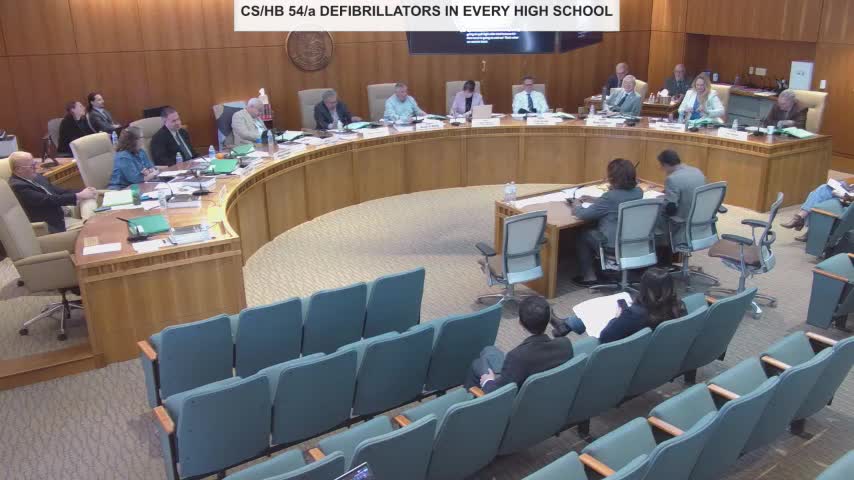Committee hears House Education substitute to add AEDs to school emergency-medication rules; funding and liability questions raised
Get AI-powered insights, summaries, and transcripts
Subscribe
Summary
The House Education Committee substitute for House Bill 54 was presented to a Senate committee to add automated external defibrillators (AEDs) to the Emergency Medication in Schools Act. Testimony covered device function, training, estimated costs and phased funding tied to other bills; committee moved a due-pass recommendation.
A Senate committee considered a House Education substitute for House Bill 54 that would add automated external defibrillators, or AEDs, to the Emergency Medication in Schools Act and require schools to include AEDs and related training in their emergency plans.
Mahesh Sita of the American Heart Association described the machines and the training approach. "AEDs are used when in cases of only in cases of sudden cardiac arrest. So there is no heartbeat. And, you know, the AEDs will assess if a person needs, the shot, and they calibrate how much shot it needs," Sita told the committee.
Committee members pressed for costs, phased implementation and liability protections. The sponsor and witnesses said the fiscal report shows training cost estimates of about $780,000 and an equipment cost figure of $262,000; proponents said an individual AED cost was estimated at about $1,200 per unit. Committee testimony described a phased implementation: initial funding would focus on public high schools in the first years, with expansion to elementary and middle schools and charter schools in later years tied to a separate Senate bill (SB494) that the presenter said allocates initial funding.
On liability, presenters pointed to existing protections when schools adopt safety plans and training. A committee witness summarized: "When schools had a plan, a safety plan for utilizing instruments like a defibrillator, it did limit liability." Senators asked whether the state's Good Samaritan law or the New Mexico cardiac-arrest response statute would cover staff and volunteers; witnesses said plans and insurance reduce exposure but did not claim absolute immunity.
Other discussion covered maintenance and oversight. Committee members urged that maintenance schedules, pad and battery replacement and reminder systems be built into implementation. A senator suggested using centralized procurement or an RFP to lower per-unit costs and include maintenance services.
The committee moved a due-pass recommendation on House Bill 54. The motion recorded in the transcript was announced as a due-pass motion from "Senator Neer, second by Senator Trujillo." The transcript records the committee proceeding toward adjournment after the vote; specific committee vote tallies for the due-pass motion were not clearly listed in the hearing record excerpt provided to the committee.
The bill will proceed to the Senate floor. Committee members signaled interest in tracking implementation details — procurement method, maintenance plans and training obligations — as the measure moves forward.
